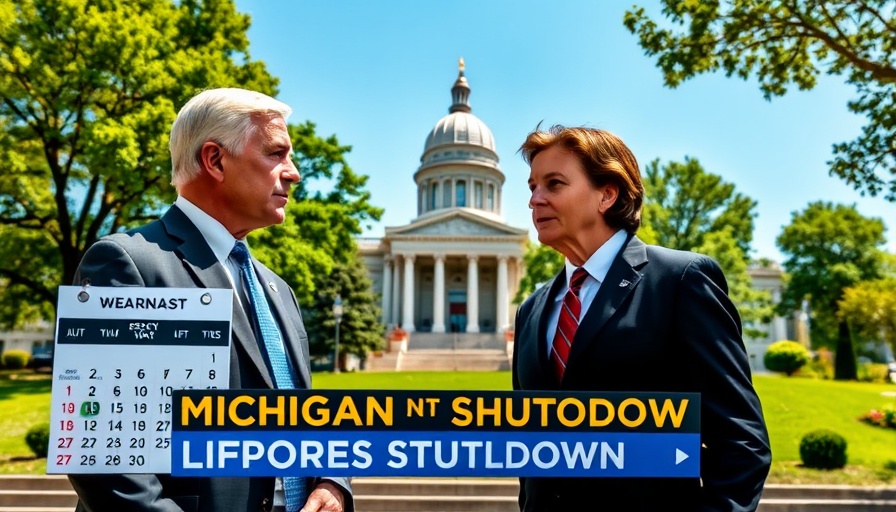
The Cashless Bail Controversy: A New Directive from President Trump
In a bold move that could reshape the legal landscape regarding pre-trial release, President Trump recently issued an executive order that targets cashless bail systems. This decision is steeped in a myriad of implications for both proponents and opponents of the bail reform, particularly as it addresses poverty and crime in a significant way.
In 'President Trump issues executive order to end cashless bail', the discussion dives into the ramifications of cashless bail practices and their societal impacts, prompting an analysis of their relevance in Michigan.
Cashless bail, championed by numerous advocates as a fairer alternative for those unable to afford bonds, aims to eliminate what many see as a discriminatory practice that unfairly criminalizes poverty. However, President Trump argues that eliminating cash bail incentivizes crime, allowing individuals arrested for serious offenses to be released without accountability.
Trump's message during the announcement reinforced his belief that the cashless bail system is an ineffective approach to maintaining public safety, stating, "If you don't have to post that kind of bond, you're just out in the street again and you're committing more crimes." His assertion raises alarms about the balance between ensuring public safety and protecting the rights of individuals who may not have the financial means to afford bail.
The Historical Context of Bail Reform
The bail system has been a topic of contention for decades, particularly as it relates to the socioeconomic factors that play a role in a person's ability to secure release from custody. Traditionally, those who could not afford bail faced prolonged detention, often for non-violent crimes. This practice has drawn considerable scrutiny for disproportionately impacting low-income individuals and communities of color.
In contrast, places like Illinois, New Jersey, and New Mexico have begun implementing cashless bail systems, arguing that these systems are intended to minimize the socioeconomic bias that often plagues the criminal justice system. Trump's executive order raises questions about the future of these reforms, suggesting a potential federal crackdown on cashless bail states.
Social Implications: Who Benefits?
Supporters of cashless bail reforms believe that by removing the requirement of financial bonds, jurisdictions can better protect the rights of individuals while fostering a more equitable justice system. Yet, they worry that the President's directive may funnel local and state governments back towards a system that prioritizes wealth over justice.
For many residents in Michigan and particularly in Metro Detroit, this issue hits close to home. With communities grappling with high crime rates and significant economic disparities, the impact of cashless bail could alter the dynamics of public safety in their neighborhoods. Advocates argue that gone unchecked, the reinstatement of cash bail systems could lead to increased incarceration rates among those who are only accused, not convicted.
Path Ahead: Balancing Justice and Public Safety
The debate surrounding cashless bail is not merely a legal issue; it’s deeply intertwined with perceptions of safety, financial inequity, and community trust. As communities like Detroit assess their own priorities, the Governor and local officials may find themselves navigating a challenging landscape where they must weigh public safety against the equitable treatment of their constituents.
For those who argue against cash bail strategies, the narrative often reflects broader social injustices that have persisted historically: the financial inability to secure one's release putting individuals at a greater disadvantage in a system designed, ostensibly, to uphold justice.
Looking at Current Events: The Political Landscape
Trump's executive orders are not occurring in a vacuum. They are situated within a broader narrative of crime and public safety that influences national and state politics. As seen in the video, the intersection of crime control policy and administration power has become a subject of heated debate. Examples of similar measures can be drawn from past administrations, showing how federal involvement can sometimes infringe upon state sovereignty.
This current climate compels us to ask how local governments and citizens can respond effectively. Michigan stands at a crossroads, where local legislators must reevaluate their strategies to ensure that law enforcement methods align with community needs while also fostering a fair judicial process.
Actionable Insights: Preparing for Change
Given the significant shifts being proposed, residents of Metro Detroit and surrounding areas would benefit from staying informed. Engaging with local governance, attending community meetings, and voicing concerns regarding public safety now more than ever is crucial. Emphasizing transparency and inclusivity in discussions surrounding the implementation of cashless bail policies can help residents to better understand the potential consequences of these reforms.
The need for a collaborative effort to develop solutions that adequately balance public safety with equity within the justice system is essential for meaningful reform. Proactive communication between the community and local leaders will ensure that the voices of Michigan residents are considered in this evolving conversation.
 Add Row
Add Row  Add
Add 



Write A Comment